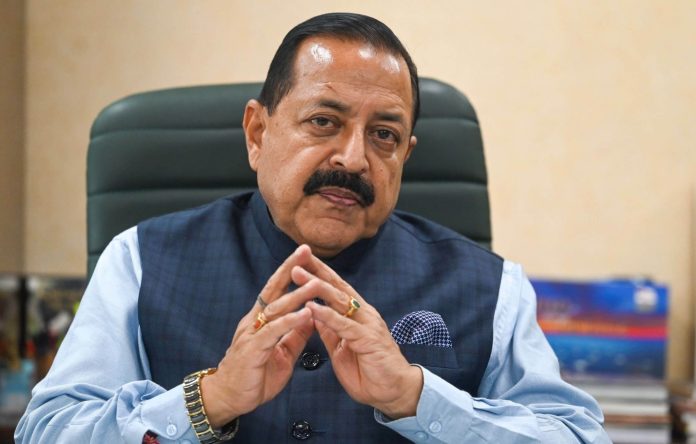NEW DELHI, Dec 28: Following the mantra of ‘maximum governance, minimum government,’ the Personnel Ministry in 2023 took several steps to transform the government offices, generating wealth from waste, and ensuring ease of living for pensioners.
Union Minister of State for Personnel Jitendra Singh described the year as a ”significant” one, due to the various pro-people and pro-employee measures taken by the central government.
Prime Minister Narendra Modi ensured that technology is used as a tool to ensure transparency, accountability and citizen centricity in the governance, he said.
”The year 2023 has been a significant one for the Personnel Ministry. Several pro-people and pro-employee steps were taken. This included grant of mass-promotions to a large number of employees, cleanliness campaign was undertaken at a record over one lakh sites and a high number of public grievances were resolved,” he said.
Singh said the central government has earned Rs 1,162.49 crore in revenue selling scrap and other unwanted items in the three special cleanliness campaigns it carried out between 2021 and 2023. Of the total amount, Rs 556 crore was earned during the third edition of cleanliness campaign alone carried out in October this year.
Through cleanliness campaigns, areas in government office premises which were earlier filled with junk, discarded furniture, and construction materials, have now been developed into courtyard and staff lounges.
Around 1,600 square feet of space above the ‘Sancharika canteen’ in the Dak Bhawan Annexe building was a dumpyard with unwanted items but the Department of Posts transformed it into a ‘Vishrantika,’ or a staff lounge, complete with indoor games like table tennis, chess, carrom, and space for reading newspapers and magazines.
Between January and November, the ministry also received 19.45 lakh public grievances on the Centralised Public Grievance Redressal and Monitoring System (CPGRAMS), a portal that allows citizens to file their complaints against government departments.
Singh said it was a personal intervention of Prime Minister Modi that shaped the CPGRAMS, which is built with latest technology tools.
Ease of living and dignity for the pensioners through digital life certificates using the face recognition technology was also one of the initiatives the ministry worked on during the year.
Pensioners can submit life certificates, a mandatory requirement for continuation of pension, digitally.
The Department of Pension and Pensioners’ Welfare (DoPPW), under the Personnel Ministry, had in September asked all banks to create awareness among the super senior pensioners (those aged 80 and above) about how they can use the facility of getting a life certificate digitally by using the face authentication technology.
Banks can facilitate the submission of life certificates by deputing doorstep banking executives, read the order, meant for about 69.76 lakh central government pensioners.
The Personnel Ministry has also been taking steps to bring in private sector talent in the government. In June this year, it decided to recruit three joint secretaries, and 14 directors and deputy secretaries from the private sector through lateral entry. It has already asked the Union Public Service Commission to induct these officers from the private sector in six departments.
Started in 2018, this is the fourth such recruitment drive — referred to as the appointment of private sector specialists in government departments — to bring fresh talent and augment manpower.
The proposed recruitment is in addition to 20 such specialists — four joint secretaries and 16 directors and deputy secretaries — who have been sought to be inducted through lateral recruitment.
Meanwhile, the government also started the process of recruitment empty posts in the anti-corruption ombudsman Lokpal and transparency watchdog Central Information Commission, or CIC.
The Centre had in August appointed Press Council of India chairperson Justice Ranjana Prakash Desai to head a 10-member search committee to recommend the chief and members of Lokpal.The committee has sought applications for the posts of chairperson and members of Lokpal.
Lokpal has been working without a regular chief for over a year. At present, there is a vacancy of three members — two judicial and a non-judicial one — in the Lokpal, according to the latest official data.
The anti-graft ombudsman is headed by a chairperson and can have eight members — four judicial and non-judicial members each.
There is a vacancy of eight Information Commissioners (against the sanctioned strength of 10) in the CIC, which is headed by a Chief Information Commissioner, according to the latest official data. (Agencies)
Home Latest News Personnel Ministry Spearheads Govt Offices Transformation, ‘Good Governance’ Steps In 2023


